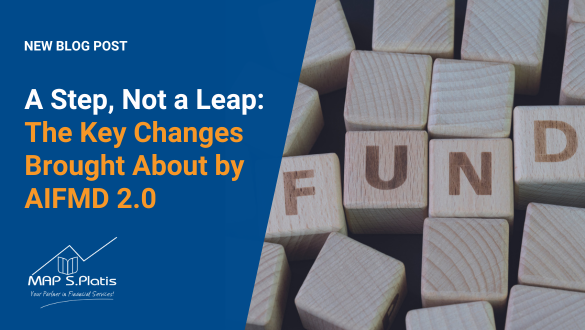By Athos Myrianthous
Executive Director, MAP Fund Management Services (MAP FMS)
On 26 March 2024, a revised version of the Alternative Investment Fund Manager Directive (AIFMD), colloquially known as AIFMD 2.0, was published in the Official Journal of the European Union. While not a total makeover, this new iteration of the AIFMD represents a significant upgrade of the EU investment funds’ regulatory regime.
AIFMD 2.0 entered into force on 15 April 2024 with Member States now having two years to transpose the Directive into their domestic law. Below we look at some of the key changes expected under the revised AIFMD:
Additional Disclosure Requirements
AIFMD 2.0 adds to the information to be provided to the National Competent Authorities (NCAs) before authorisation, to also include:
- Information on the persons who effectively conduct the AIFM’s business.
- Any arrangements for delegation (or sub-delegation).
- The resources (human and technical) employed by the AIFM for day-to-day portfolio or risk management and the monitoring of any delegated functions.
- The resources (human and technical) employed to ensure compliance with the AIFMD.
- For the Alternative Investment Funds (AIFs) that the AIFM manages, a description of the functions of portfolio or risk management that are to be delegated and if those functions will be delegated in full or partially.
Annex IV Reporting
The Annex IV periodic reporting obligation is now extended to cover the market, instrument and asset exposure of AIFs, a list of EU Member States where AIFs are marketed, the total amount of leverage employed, delegation, and other areas. AIFMD 2.0 now mandates ESMA to develop and submit to the European Commission by 16 April 2027 an updated Annex IV reporting template and RTS. ESMA has to determine the reporting’s technical standards, frequency and timing, as well as the standardisation of its information.
Article 23 Investor Disclosures
Article 23 disclosures are broadened to include:
- The circumstances triggering the use of liquidity-management tools by the AIFM.
- The annual fees, charges, and expenses relating to the AIFs’ operations to be directly or indirectly allocated by the AIFM to the AIFs.
- The originating loans portfolio composition.
Organization Provisions
AIFMD 2.0 introduces the requirement for an AIFM to employ at least two, full time, EU-resident persons of good repute and with the appropriate qualifications to act as employees or Directors of the AIFM. The Directive also includes a review clause, mandating the European Commission to assess the impact of the introduction of a requirement to include at least one Non-Executive or Independent Director on the Board of an AIFM.
Distribution
The updated AIFMD provides that where funds managed by EU AIFMs have their units marketed by companies with a MiFID license ‘acting on their own behalf’, despite of any distribution agreement in place, these should not be considered as delegates of the AIFM.
Delegation
The requirement for AIFMs to comply with the Art. 20 (1) delegation provisions is now broadened to apply to all functions included in Annex I and to the Markets in Financial Instruments Directive (MiFID) services, which an AIFM may provide under the top-up permissions. Furthermore, AIFMD 2.0 provides for increased disclosure requirements to regulators in relation to arrangements for delegation (or sub-delegation), including information provided at the authorisation stage.
Liquidity Management Tools
AIFMD 2.0 adds new liquidity-related requirements for AIFMs who manage open-ended AIFs. Such AIFMs are now obliged to choose at least two tools, which would be considered ‘appropriate’ after assessing, from a list of nine liquidity management tools (found in Annex V of the Directive):
- The tools’ suitability according to the AIF’s investment strategy.
- The AIF’s liquidity profile.
- The policy of the AIF in relation to redemptions.
Introduction of a Loan Origination Regime
By amending Annex I, the revised Directive adds ‘’originating loans on behalf of an AIF” to the functions that may be additionally performed by an AIFM, thus enabling AIFMs, subject to certain rules, to manage ‘loan originating AIFs’. AIFs originating loans would be subject to:
- Risk retention requirements.
- Restrictions on lending.
- Concentration limits.
- Prohibition on managing AIFs that originate loans for the only purpose of selling to third parties.
The Directive further provides that ‘effective policies, procedures and processes’ should be implemented by the AIFM for credit risk assessing and their credit portfolio monitoring.
Appointing a Depositary Established in Another Member State
AIFMD 2.0 amends the requirement in Article 21 for the Depositary of an AIF to be established in their home Member State. Subject to certain conditions, the home NCA could allow the appointment of a Depositary that is established in another member state. The revised Directive provides that such delegation be assessed by the home NCA on a case-by-case basis, and the AIFM must demonstrate all the below:
- Lack of Depositary services in the AIF’s home Member State.
- The national Depositary market (i.e. aggregate AIF assets under safekeeping) in the AIF’s home Member State does not surpass EUR 50 billion.
- For non-EU AIFs, the third country where the proposed Depositary is established is not a high-risk jurisdiction, in accordance with the 4th EU Money Laundering Directive, or a non-cooperative tax jurisdiction.
The home NCA must notify ESMA whether or not they will permit such a Depositary appointment.
Overall, AIFMD 2.0 may not bring about radical or considerably changes to the EU legal framework for investment funds. The EU legislator chose the route of targeted regulatory updates, modernising specific aspects and clarifying existing ambiguities in the Law. With the finish line being to further integrate the EU asset management markets, this choice was one of taking a step, rather than a leap, towards the establishment of a truly single homogeneous European capital market.
MAP S.Platis can provide comprehensive advisory support to Funds and Fund Managers.
Please contact us for more information on our related services.

